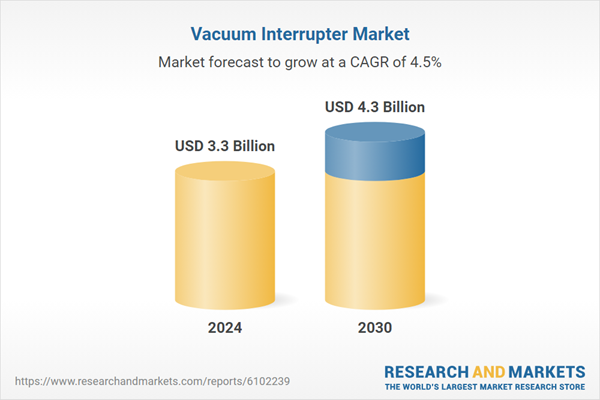Speak directly to the analyst to clarify any post sales queries you may have.
10% Free customizationThis report comes with 10% free customization, enabling you to add data that meets your specific business needs.
The ongoing shift toward renewable energy is also boosting adoption, as vacuum interrupters support switching operations in solar, wind, and storage systems. Governments' investments in smart grid initiatives and eco-friendly alternatives to SF₆-based technologies are further accelerating market expansion. In addition, advancements in design compactness and extended service life are enhancing deployment across circuit breakers, reclosers, and contactors. Rising electricity consumption - driven by EV infrastructure, data centers, and digitization - continues to unlock new application opportunities for vacuum interrupters globally.
Key Market Drivers
Grid Modernization and Renewable Energy Integration
The ongoing modernization of electrical grids and growing integration of renewable energy sources are key drivers boosting the vacuum interrupter market. Developed economies such as the U.S., Germany, the UK, and Japan are transitioning to smarter, more efficient grids equipped with real-time monitoring and automation. In these modern networks, vacuum interrupters serve as reliable and eco-friendly components, replacing traditional SF₆-based breakers. Simultaneously, the increasing adoption of variable renewable energy sources like solar and wind demands dynamic and efficient switching technologies. Vacuum interrupters, known for rapid arc extinguishing and durability in diverse conditions, are highly suited for managing the variability of renewable generation. Their minimal maintenance needs and high operational reliability make them ideal for use in distributed energy systems, further strengthening their role in modern power infrastructure.Key Market Challenges
High Initial Costs and Capital-Intensive Manufacturing
A significant challenge in the vacuum interrupter market is the high initial cost involved in production and deployment. These devices require precision engineering and specialized materials such as ceramics and metal alloys, along with sophisticated manufacturing infrastructure. As a result, vacuum interrupters typically cost more upfront compared to traditional alternatives, especially in low- and medium-voltage applications. Cost constraints are especially relevant in developing countries, where budget-conscious utility and electrification projects may favor less expensive but higher-maintenance technologies. Additionally, limited production scale for specialized interrupter designs often leads to higher per-unit costs, making it difficult for smaller manufacturers to compete with global players that benefit from advanced production capabilities and economies of scale.Key Market Trends
Rapid Adoption of Smart Grid and Digital Switchgear Technologies
The swift shift toward smart grid deployment and digital switchgear solutions is reshaping the vacuum interrupter market. Utilities are increasingly incorporating sensors, digital control units, and communication technologies to enable real-time diagnostics, automated fault detection, and predictive maintenance. Vacuum interrupters are well-suited for integration into such digital systems due to their high reliability, compact form factor, and low maintenance. Unlike conventional breakers that require manual servicing, vacuum interrupters equipped with smart diagnostics can alert operators to abnormal conditions, minimizing downtime. National grid modernization programs in countries like China, the U.S., and Germany are further accelerating the shift from legacy systems to smart infrastructure, positioning vacuum interrupters as a standard component in future-ready electrical networks.Key Market Players
- ABB Ltd.
- Eaton Corporation plc
- General Electric Company
- Siemens AG
- Toshiba Corporation
- Meidensha Corporation
- Schneider Electric SE
- Mitsubishi Electric Corporation
Report Scope:
In this report, the Global Vacuum Interrupter Market has been segmented into the following categories, in addition to the industry trends which have also been detailed below:Vacuum Interrupter Market, By Design Type:
- Single Break
- Double Break
- Multiple Break
Vacuum Interrupter Market, By Application:
- Power Generation
- Transmission & Distribution
- Industrial Applications
- Renewable Energy
- Others
Vacuum Interrupter Market, By End Use:
- Utilities
- Manufacturing
- Commercial
- Residential
- Others
Vacuum Interrupter Market, By Region:
- North America
- United States
- Canada
- Mexico
- Europe
- Germany
- France
- United Kingdom
- Italy
- Spain
- Asia Pacific
- China
- India
- Japan
- South Korea
- Australia
- South America
- Brazil
- Colombia
- Argentina
- Middle East & Africa
- Saudi Arabia
- UAE
- South Africa
Competitive Landscape
Company Profiles: Detailed analysis of the major companies present in the Global Vacuum Interrupter Market.Available Customizations:
With the given market data, the publisher offers customizations according to a company's specific needs. The following customization options are available for the report.Company Information
- Detailed analysis and profiling of additional market players (up to five).
This product will be delivered within 1-3 business days.
Table of Contents
Companies Mentioned
- ABB Ltd.
- Eaton Corporation plc
- General Electric Company
- Siemens AG
- Toshiba Corporation
- Meidensha Corporation
- Schneider Electric SE
- Mitsubishi Electric Corporation
Table Information
| Report Attribute | Details |
|---|---|
| No. of Pages | 188 |
| Published | June 2025 |
| Forecast Period | 2024 - 2030 |
| Estimated Market Value ( USD | $ 3.3 Billion |
| Forecasted Market Value ( USD | $ 4.3 Billion |
| Compound Annual Growth Rate | 4.5% |
| Regions Covered | Global |
| No. of Companies Mentioned | 8 |









